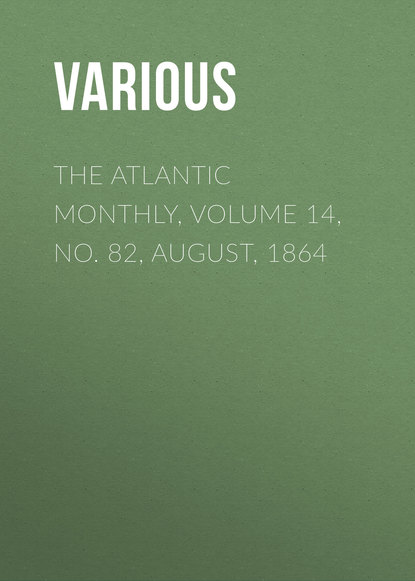По всем вопросам обращайтесь на: info@litportal.ru
(©) 2003-2024.
✖
The Atlantic Monthly, Volume 14, No. 82, August, 1864
Автор
Год написания книги
2018
Настройки чтения
Размер шрифта
Высота строк
Поля
"The Governor was a stern veteran, with a powerful brow, a shaggy eyebrow, and a piercing eye. He never rose, but leaned his chin on his hand, and his elbow on a table that stood between them, and eyed the new-comer very fixedly and strangely.
"'We did not expect to see you on this side of the Pyrenees.'
"'Nor I myself, Governor.'
"'What do you come to me for?'
"'A welcome, a suit of regimentals, and money to take me to Paris.'
"'And suppose, instead of that, I turn out a corporal's guard, and bid them shoot you in the court-yard?'
"'It would be the drollest thing you ever did, all things considered,' said the other, coolly; but he looked a little surprised.
"The Governor went for the book he had lately consulted, found the page, handed it to the rusty officer, and watched him keenly: the blood rushed all over his face, and his lip trembled; but his eye dwelt stern, yet sorrowful, on the Governor.
"'I have read your book: now read mine.'
"He drew off his coat, and showed his wrists and arms, blue and waled.
"'Can you read that, Monsieur?'
"'No.'
"'All the better for you! Spanish fetters, General.'
"He showed a white scar on his shoulder.
"'Can you read that, Sir?'
"'Humph?'
"'This is what I cut out of it,'—and he handed the Governor a little round stone, as big and almost as regular as a musket-ball.
"'Humph! that could hardly have been fired from a French musket.'
"'Can you read this?'—and he showed him a long cicatrix on his other arm.
"'Knife, I think?' said the Governor.
"'You are right, Monsieur: Spanish knife!—Can you read this?'—and opening his bosom, he showed a raw and bloody wound on his breast.
"'Oh, the Devil!' cried the General.
"The wounded man put his coat on again, and stood erect and haughty and silent.
"The General eyed him, and saw his great spirit shining through this man. The more he looked, the less could the scarecrow veil the hero from his practised eye.
"'There has been some mistake, or else I dote—and can't tell a soldier from a'—
"'Don't say the word, old man, or your heart will bleed!'
"'Humph! I must go into this matter at once. Be seated, Captain, if you please, and tell me what have you been doing all these years?'
"'Suffering!'
"'What, all the time?'
"'Without intermission.'
"'But what? suffering what?'
"'Cold, hunger, darkness, wounds, solitude, sickness, despair, prison,—all that man can suffer.'
"'Impossible! a man would be dead at that rate before this.'
"'I should have died a dozen times, but for one thing.'
"'Ay! what was that?'
"'I had promised to live.'
"There was a pause. Then the old man said, calmly,—
"'To the facts, young man: I listen.'"
And high time, be it said; since it begins to read very much like one of Artemas Ward's burlesques. The upshot of which listening was, that the man left for Paris directly in the demanded regimentals, and wrapt about with the Governor's furred cloak to boot; that he would not delay in the metropolis one moment, even to put on the epaulets they gave him, but saved them for his sweetheart to make him a colonel with, and, though weary and torn with pain, galloped away to the Chateau de Beaurepaire, to find that sweetheart another man's wife.
"He turned his back quickly on her. 'To the army!' he cried, hoarsely. He drew himself haughtily up in marching-attitude. He took three strides, erect and fiery and bold. At the fourth the great heart snapped, and the worn body it had held up so long rolled like a dead log upon the ground, with a tremendous fall."
Which scene must be followed by its pendant, taking place during the siege of a Prussian town, when, from the enemy's bastion, Long Tom, out of range of Dujardin's battery, was throwing red-hot shot, sending half a hundred-weight of iron up into the clouds, and plunging it down into the French lines a mile off.
"'Volunteers to go out of the trenches!' cried Sergeant La Croix, in a stentorian voice, standing erect as a poker, and swelling with importance.
"There were fifty offers in less than as many seconds.
"'Only twelve allowed to go,' said the Sergeant; 'and I am one,' added he, adroitly inserting himself.
"A gun was taken down, placed on a carriage, and posted near Death's Alley, but out of the line of fire.
"The Colonel himself superintended the loading of this gun; and to the surprise of his men had the shot weighed first, and then weighed out the powder himself.
"He then waited quietly a long time, till the bastion pitched one of its periodical shots into Death's Alley; but no sooner had the shot struck, and sent the sand flying past the two lanes of curious noses, than Colonel Dujardin jumped upon the gun and waved his cocked hat. At this preconcerted signal, his battery opened fire on the bastion, and the battery to his right hand opened on the wall that fronted them; and the Colonel gave the word to run the gun out of the trenches. They ran it out into the cloud of smoke their own guns were belching forth, unseen by the enemy; but they had no sooner twisted it into the line of Long Tom than the smoke was gone, and there they were, a fair mark.
"'Back into the trenches, all but one!' roared Dujardin.
"And in they ran like rabbits.
"'Quick! the elevation.'











